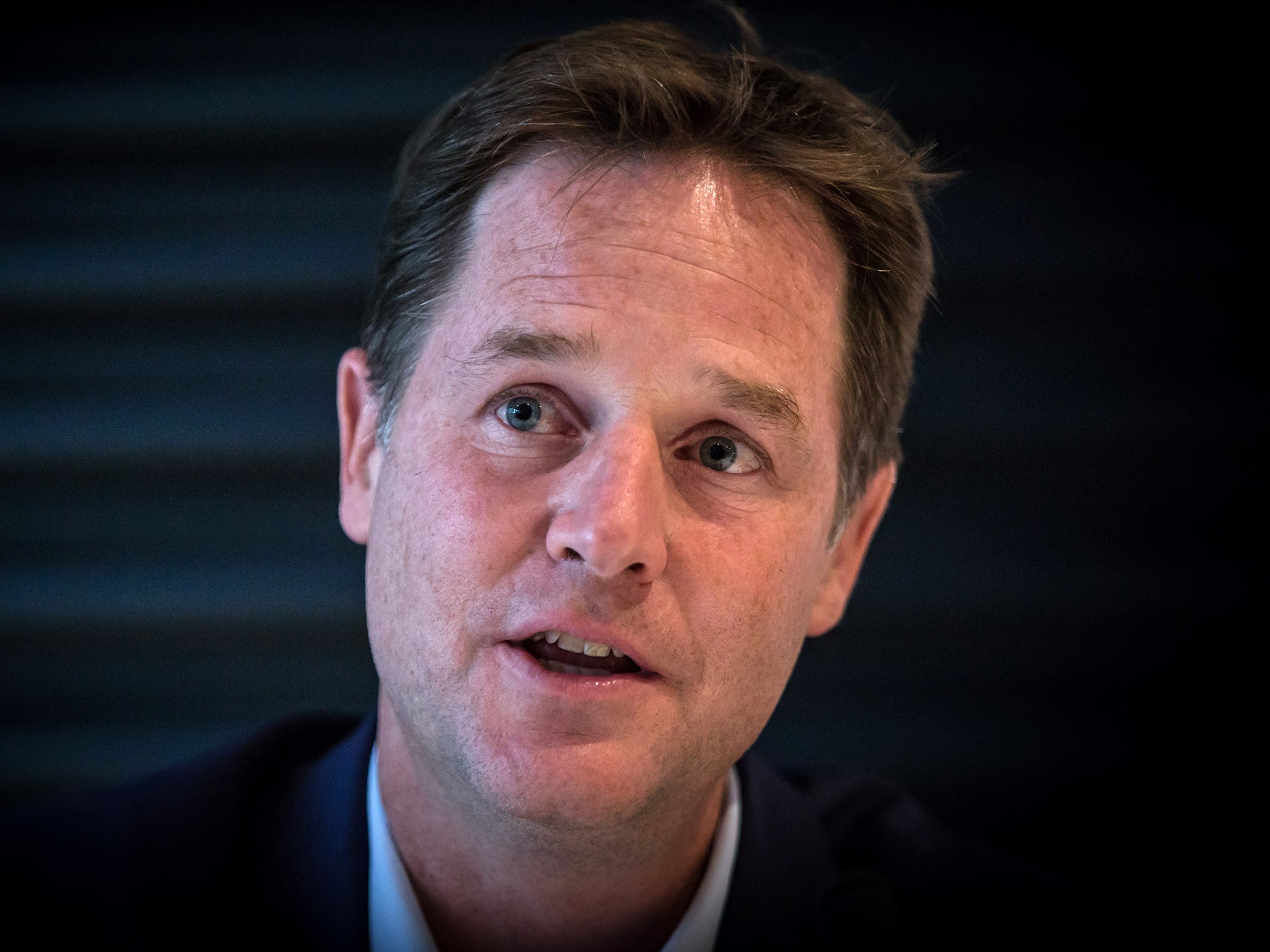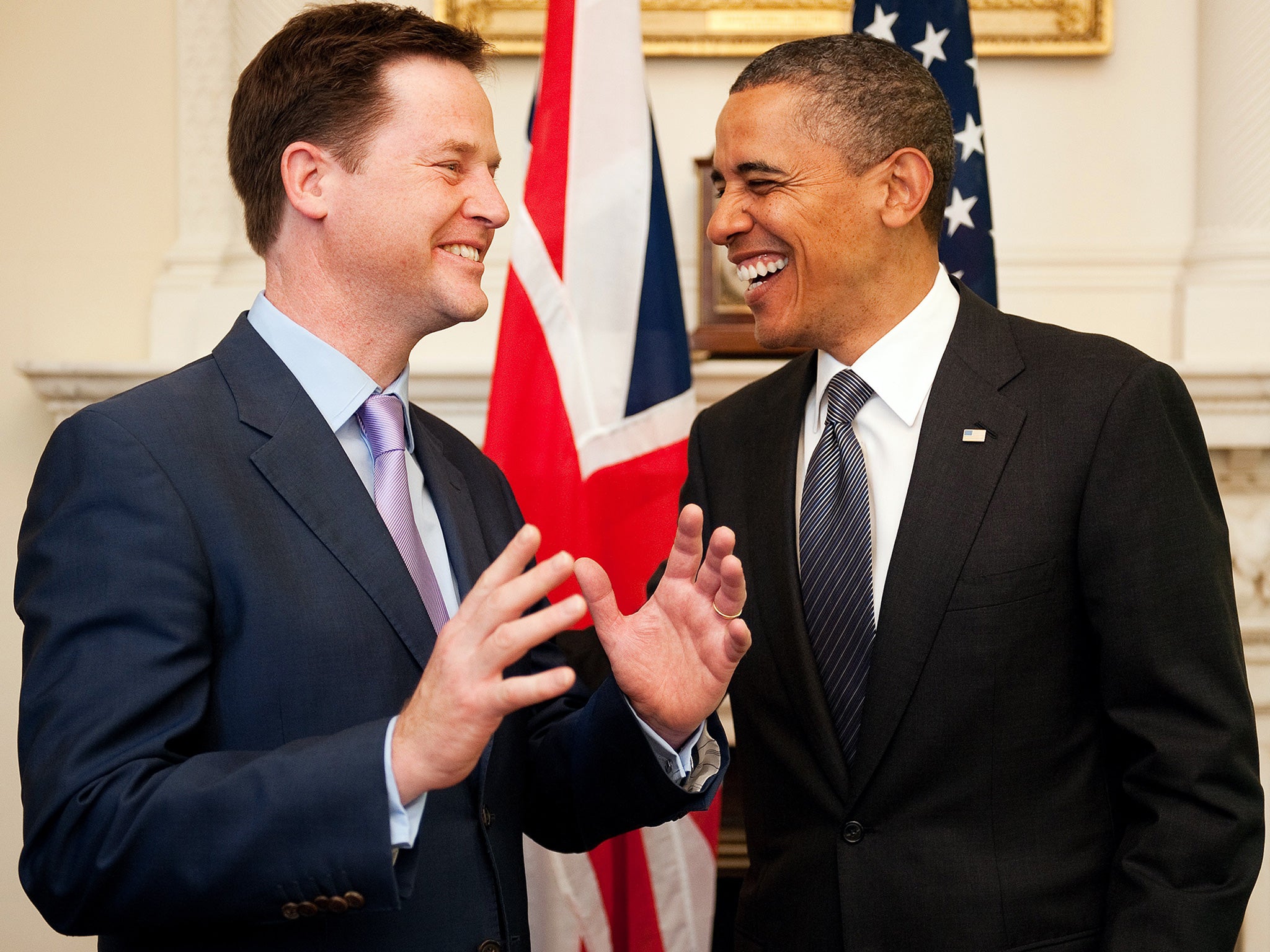EU referendum: Clegg warns Brexit will leave Britain with ‘no empire, no Union and no special relationship’ with US
Former Deputy Prime Minister says fight represents a choice between ‘Great Britain or Little England’

Your support helps us to tell the story
From reproductive rights to climate change to Big Tech, The Independent is on the ground when the story is developing. Whether it's investigating the financials of Elon Musk's pro-Trump PAC or producing our latest documentary, 'The A Word', which shines a light on the American women fighting for reproductive rights, we know how important it is to parse out the facts from the messaging.
At such a critical moment in US history, we need reporters on the ground. Your donation allows us to keep sending journalists to speak to both sides of the story.
The Independent is trusted by Americans across the entire political spectrum. And unlike many other quality news outlets, we choose not to lock Americans out of our reporting and analysis with paywalls. We believe quality journalism should be available to everyone, paid for by those who can afford it.
Your support makes all the difference.Britain will be left with “no empire, no union and no special relationship” with the US if the country votes to pull out of Europe, the former Deputy Prime Minister Nick Clegg has warned.
In his first major intervention into the referendum debate ahead of President Barack Obama’s visit to the UK on Thursday to give his endorsement to the Remain campaign Mr Clegg said the referendum fight represented a choice between “Great Britain or Little England”.
And he suggested that a vote to leave would not only damage Britain’s relationship with the US, but could also end up splitting the UK, with Scotland breaking away to remain in the European Union, leaving England and Wales isolated.
“Leaving the European Union will have an unravelling effect on all our most important relationships – with our neighbours in Europe, with our cousins in America and even with our brothers and sisters within the United Kingdom if it pushes Scotland closer to independence. We will be left with no empire, no union and no special relationship. We will never have been so alone. Never so isolated. Never so powerless.”
In his speech to Princeton University in New Jersey, Mr Clegg also warned that a vote to leave would mean the UK “sacrificing our seat at the top table” of world affairs in favour of a “new era of isolation”.
“Without a leadership role in the union of 500 million citizens on our doorstep, why should the Americans or the Indians or the Chinese, actually listen to us?” Mr Clegg said. “We can’t influence the rest of the world if we retreat from our corner of it.”
Mr Clegg poured scorn of the leaders of the Leave campaign for disparaging the views of President Obama and other leading US political figures in favour of those expounded by the Republican Presidential contender Donald Trump.
A British exit would be the most isolationist deed in the past century
“The choice for any British voter who cares about American opinion couldn’t be clearer: Trump wants Britain out of the EU; President Obama wants us to stay in. I know who’s side I – and I suspect millions of other Brits – would rather be on.”
Mr Obama is due to fly into London on Thursday night for a two-day visit that will include a press conference in Downing Street and a town-hall question-and-answer session in London.

The US President will use the trip to weigh in on the side of the Remain campaign – and make clear the fabled “special relationship” with the US depends as much on Britain’s position as a leading member of the EU as it does on the historic tied between the two countries. Downing Street hopes that the President’s message will cut through to undecided voters in a way in that warnings of Brexit from other international institutions has not.
In Parliament, David Cameron urged people to listen to what Mr Obama had to say. “Personally, I believe we should listen to advice from friends and other countries, and I struggle to find the leader of any friendly country who thinks we should leave,” the Prime Minister said.
In his speech, Mr Clegg claimed that Brexit would reduce Britain’s importance to the US as an ally.
“When it comes to transatlantic trade, information- and intelligence-sharing and influence on our shared strategic priorities, whether it is fighting climate change or tackling stateless terrorism, Britain remains one of America’s most important allies because of the clout we wield – and are capable of wielding – across our own continent,” he said. “But without that ability to influence Europe’s economic and trade priorities, or its approach to intelligence and information sharing, or how we work together to fight climate change or tackle terrorism, Britain’s value to America is severely diminished.”
Larry Summers, who served as Treasury Secretary in Bill Clinton's administration, told BBC Radio 4's Today programme that Brexit would be “the most isolationist deed in the past century” and would damage Britain's economic future and standing in the world, as well as reducing the effectiveness of the transatlantic special relationship.
But prominent Leave campaigner and former defence secretary Liam Fox challenged the assessment that Brexit would diminish the UK's role in the world.
“There are many other areas than just money where Britain matters, security being one of them – we have the world's fifth biggest defence budget,” Dr Fox told Today. “Unless there is fundamental change in that European leadership, we will have an imploding continent, and a British exit may give them the shock therapy they require to make the change necessary to stop Europe falling apart.“
Meanwhile, the EU's most senior official admitted the 28-nation bloc had lost popularity because it over-regulated and interfered too much in people's lives.
Answering questions from British MPs in Strasbourg, European Commission president Jean-Claude Juncker said: “I think that one of the reasons that European citizens are stepping away from the European project is that we are interfering in too many domains of their private lives. And too many domains where the member states are better placed to take action and pass legislation.”
Mr Juncker insisted the commission was “doing less” now in the face of such concerns.
Join our commenting forum
Join thought-provoking conversations, follow other Independent readers and see their replies
Comments